From 12 to 18 October, Caldron Pool ran a short, 10-question survey on the issue of Covid vaccination. The survey attracted 2446 responses during this period of time.
The survey asked people about their attitude towards Covid vaccination, the safety of the Covid vaccines, and the proposed segregation of society on the basis of vaccine status (as is happening under the “roadmaps” of several Australian states). It also sought opinions about the division of church fellowships based on Covid vaccination status, and employment related vaccine mandates.
Commentary
The results of this survey reflect the views of the people who chose to complete it. Because of this “self-selection” bias, we cannot say that they are a representative cross-section of the entire population.
Nevertheless, the folk who did respond are real people who are members of Australian churches, and they have expressed their sincerely held views. The survey results present us with several important observations that responsible leaders in particular are obliged to pay attention to.
Firstly, our survey reveals that for many Australians, there is a combination of pressure to have a Covid vaccine and concerns about the safety of the vaccines. That so many people feel pressure to have a medication that they have misgivings about should give us pause. Even more troubling is the fact that 260 of our respondents have either had or are considering having a vaccine despite doubts about its safety.
This is not the place to discuss the role of “experts” and their reassurances about the “safety” of the Covid vaccines. The “safety” mantra has been repeated ad nauseum; what matters is that large numbers of people remain unconvinced. For a medication that is barely one year old, the only thing that will convince hesitant people of its safety is not an accumulation of proclamations from experts (let alone clergymen), but time.[1]
Until more people can be convinced by the passage of time that Covid vaccination is not unsafe, it is a matter of basic ethics (not to mention human decency) that our society eases off on the pressure.
Secondly, it should worry us deeply that significant numbers of people (4 in 10 of our vaccinated respondents) are being vaccinated not primarily for self-protection, nor to limit the spread of a virus, but to regain freedom and/or to maintain their employment.
The Covid vaccine is arguably the first medication in human history to be received by perhaps hundreds of thousands of people, not for medical or public health benefit, but for political and social reasons. We are in a dreadful place when people have been forced to view ordinary political freedom as contingent on reception of a medication, or conversely, reception of a medication as the only available path back to political freedom.
Worse still, our survey shows that many people will subject themselves to a medical treatment that they consider potentially unsafe, in order to win back political freedom. This ought to send chills down the spine of anybody who cherishes the ideals of liberal democracy.
Thirdly, it is clear that the vaccination-based segregation of society is something which is opposed by a great many people, whether vaccinated or not.
Fourthly, it is alarming that a significant number of Christians feel that receiving a Covid vaccine would not be the right thing to do, including a significant number of people who have already received one or may be planning to have one. That there is pressure in the picture, including the pressure of saving one’s livelihood, makes this truly appalling.
Caldron Pool has recently published a detailed exposition written by four Australian pastors, concerning the great responsibility that the church has to protect the consciences of its people. It is a terrible thing that thousands of Christians are being pressured (in many cases successfully) to take a course of action that their consciences deem wrong. This widespread wounding of conscience is a matter that the church in Australia must urgently address.
Fifthly, we can observe that at least among the 2446 people who responded to our survey, which includes people from across Australia’s major church denominations, the idea of partitioning Sunday fellowship according to Covid vaccination status is met with very strong disapproval. Even among vaccinated respondents, more than 7 out of 10 do not approve of division.
Church leaders should be aware that a decision to divide a church based on vaccination status is viewed by thousands of people, including a significant number of vaccinated people, as an act which harms gospel unity, and would damage confidence in church leadership.
Sixthly, church leaders (particularly in Victoria and New South Wales) must be aware of the many people in their congregations who have faced, or are facing the terrible choice to be vaccinated against their will in order to save their jobs. Many members of churches, perhaps thousands across the country, are likely to end up jobless under vaccine mandates. This will present a special pastoral challenge for churches, in terms of how to support and care for such people.
Thank you to all the people who took the time to respond to our survey, and for letting your voice be heard.
Many survey respondents shared their experiences and thoughts in question 11. We plan to publish a selection of these comments in the near future.
Integrity of the data
The survey recorded the IP address of each respondent. Out of a total of 2446 responses, there were 2310 unique IP addresses. Duplicate IP addresses are expected where two or more people from the same household (using the same internet connection) responded to the survey, such as a husband and wife.
There were three instances where the same IP address appeared multiple times.
- One IP address appeared six times.
- Two IP addresses appeared four times each.
In these instances, the responses given were not identical, and demographic data showed a mix of gender and age groups.
Based on the IP data, we can be confident that virtually all of the responses to the survey originated from actual, individual people.
Demographics
Responses came in from all Australian states, in a distribution that lines up with the size of the respective states. More females (1432) than males (1002) responded. In terms of religious denomination, about half of respondents (51%) identified with “other Christian church”. 16% identified as Baptist, 10% as Catholic, and 9% as Presbyterian. 2% identified as having no religion.
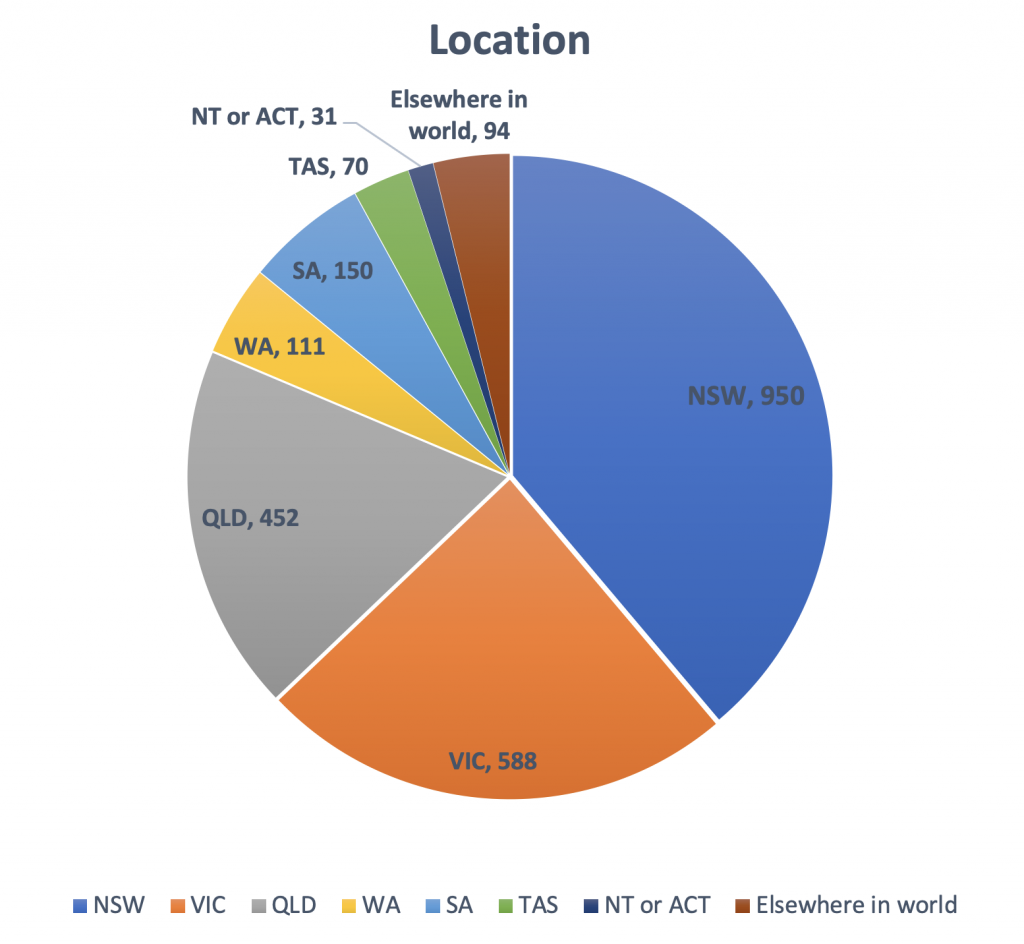
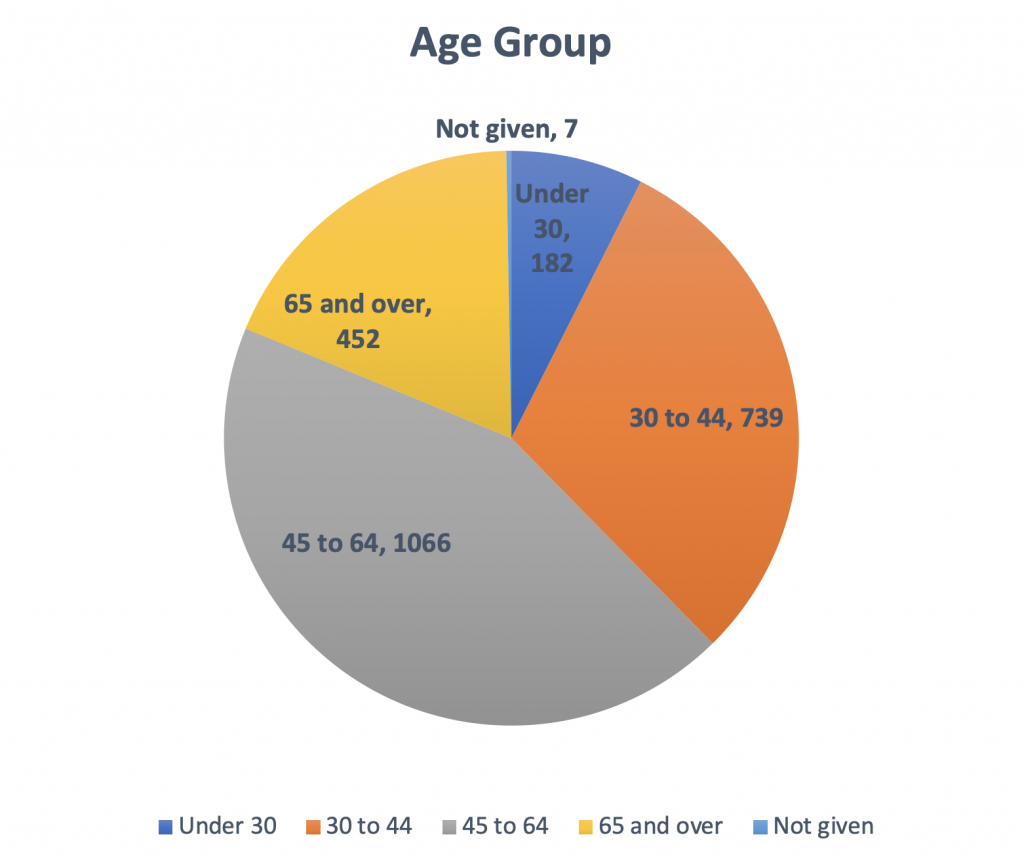
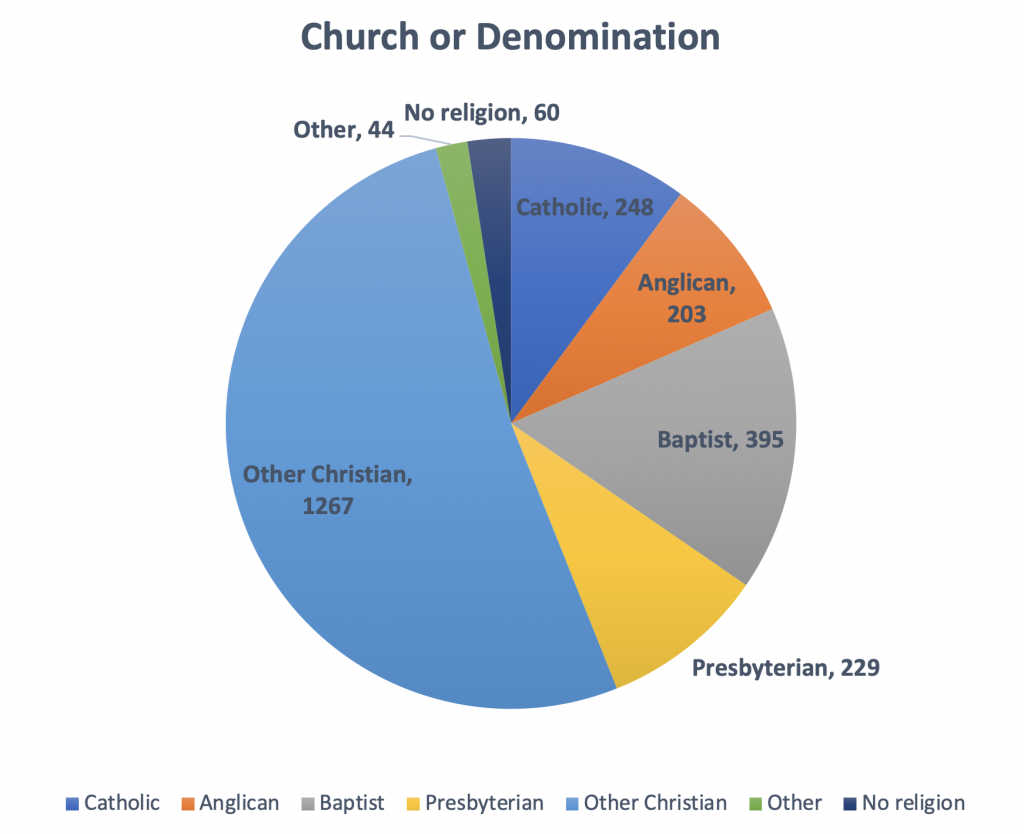
Vaccination status
Of the people who responded to the survey, 1982 declared that they were not intending to be vaccinated for Covid. 353 said they had been vaccinated (at least once), and 111 said they were considering or planning to be vaccinated.
Most important reason for being vaccinated
Of the 353 respondents who had been vaccinated, 140 (40%) said that the most important reason for being vaccinated was to regain freedoms or to maintain their employment. 108 (30%) gave protection of self as the most important reason, and 101 (28%) gave reduction in transmission of Covid as the most important reason.
Regaining freedom and/or maintaining employment was given as the most important reason by an even higher proportion of the people who said they were considering or planning to be vaccinated (63%).
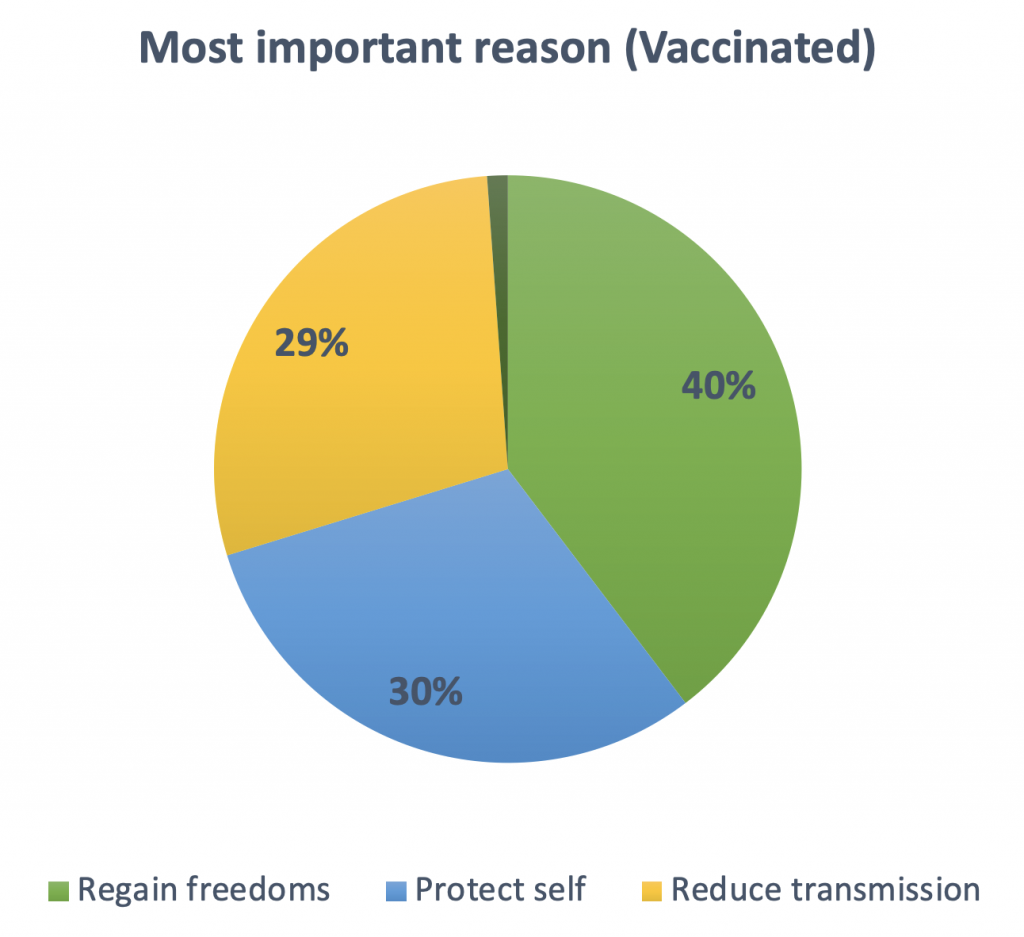
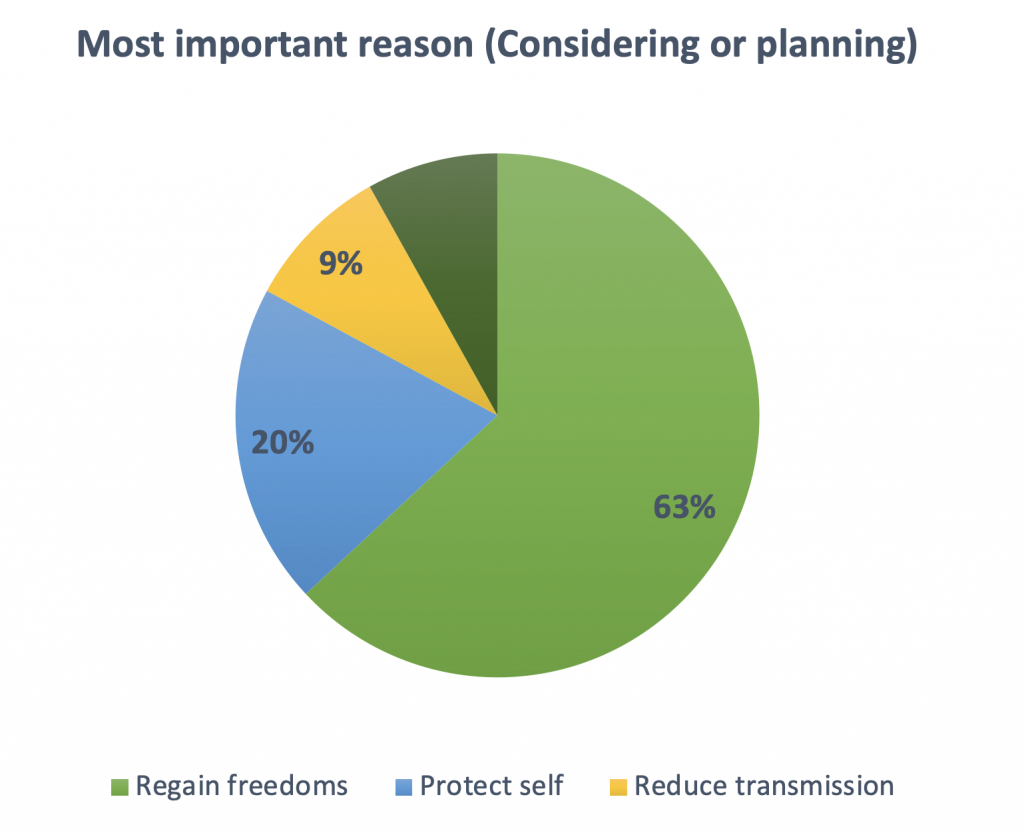
Safety concerns, pressure and social segregation
Perhaps unsurprisingly, the vast majority of unvaccinated survey respondents (93%) had concerns about the safety of the Covid vaccines. Vaccine safety was also a concern for most of those who were considering or planning to be vaccinated (90%). What is somewhat more of a surprise is that a little under half (45%) of the people who were vaccinated also expressed concern about vaccine safety.
A similar portion (45%) of vaccinated respondents reported feeling pressure to be vaccinated, and 44% objected to this pressure. 84% of those considering or planning to be vaccinated reported feeling pressure. 59% of those who were not intending to be vaccinated reported pressure.
Significant numbers from all three groups selected the option “I do not feel that being vaccinated is / was the right thing for me to do”: more than 1 in 6 (18%) of those who had been vaccinated, 45% of those considering or planning vaccination, and three quarters (75%) of those not intending to be vaccinated.
The vast majority of survey respondents objected to the segregation of society based on Covid vaccination, including 65% of those who had been vaccinated and 92% of those considering or planning to be vaccinated.
Physical division of church fellowship
Predictably, a majority of respondents overall (85%) would “strongly disapprove” of the physical division of their church’s Sunday fellowship based on vaccination status. This includes 59% of respondents who had been vaccinated. Only 18% of vaccinated respondents would “approve” of vaccine-based division of their church.
When asked their opinion of a church which divides its fellowship based on vaccination, 25% of vaccinated survey respondents expressed that this would be right; 16% because churches should be “Covid safe” and 9% because churches should obey government rulings. On the other hand, 65% of vaccinated individuals believed that division would be wrong, and more than one third (35%) said it would undermine gospel unity and cause them to lose confidence in the church’s leadership.
Of those who are not intending to be vaccinated, 80% said it would cause them to lose confidence in leadership.
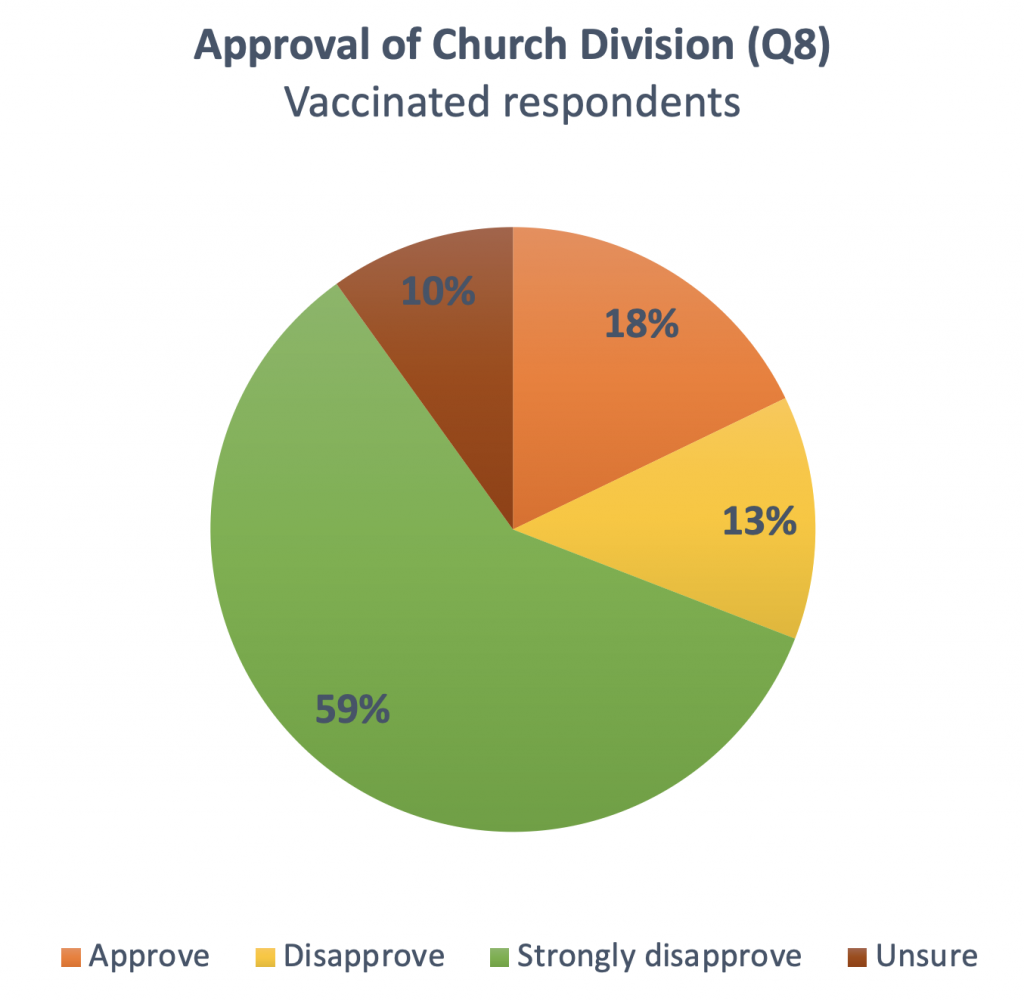
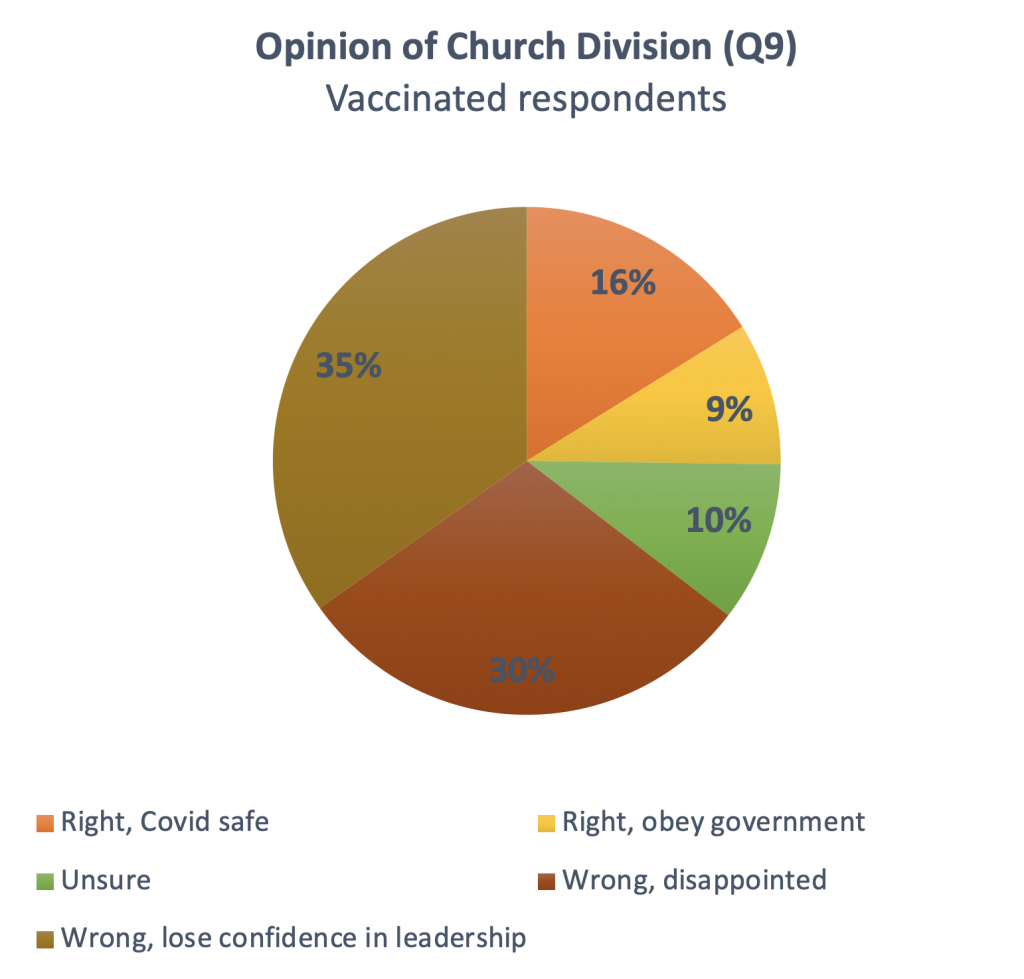
Vaccination and employment
We decided to include a question about employment, because at least two Australian states have implemented vaccine mandates for a wide range of workers.
Disturbingly, 729 of survey respondents who are not intending to be vaccinated said that they face loss of their job if they remain unvaccinated. 219 of these people are in Victoria, 292 are in New South Wales and 105 are in Queensland.
91 respondents said that they were “reluctantly vaccinated” to save their jobs.
60% of all respondents were opposed to vaccine mandates for employees outside of health care, including 56% of vaccinated respondents. The proportion of unvaccinated respondents who expressed opposition to vaccine mandates for employment was unexpectedly low (60%). This seemingly aberrant result is explained by the wording of the question (“outside of health care”)—a great many respondents clarified in question 11 that they did not believe Covid vaccination should be mandatory even for health care workers.
Detailed results for all questions
1. Where do you live?
| NSW | 950 |
| VIC | 588 |
| QLD | 452 |
| WA | 111 |
| SA | 150 |
| TAS | 70 |
| NT or ACT | 31 |
| Elsewhere in the world | 94 |
| Total | 2446 |
2. What is your gender?
| Male | 1002 |
| Female | 1432 |
| Not answered | 12 |
| Total | 2446 |
3. What is your age group?
| Under 30 | 182 |
| Between 30 and 44 | 739 |
| Between 45 and 64 | 1066 |
| 65 and over | 452 |
| Not answered | 7 |
| Total | 2446 |
4. What is your COVID vaccination status?
| Not intending to be vaccinated | 1982 |
| Considering or planning to be vaccinated | 111 |
| Vaccinated (at least once) | 353 |
| Total | 2446 |
5. What is your most important reason for getting vaccinated? (Choose one)
| Vaccination status | All | Considering or planning | Vaccinated |
| I am not intending to be vaccinated | 1961 | 9 | 4 |
| To regain freedoms (eg. travel) and/or to maintain my employment | 236 | 70 | 140 |
| To protect myself from COVID | 137 | 22 | 108 |
| To reduce the risk of transmitting COVID | 112 | 10 | 101 |
| Total | 2446 | 111 | 353 |
6. Do any of these apply to you, in relation to COVID vaccination? (Choose as many as apply)
| Vaccination status | All | Not intending | Considering or planning | Vaccinated |
| I am concerned about the safety of the COVID vaccines | 2116 | 1856 | 100 | 160 |
| I felt / feel pressured into being vaccinated | 1441 | 1189 | 94 | 158 |
| I object to being pressured into vaccination | 2026 | 1774 | 97 | 155 |
| I do not feel that being vaccinated is / was the right thing for me to do | 1602 | 1489 | 50 | 63 |
| I object to the segregation of society (eg. access to work, restaurants and cinemas) on the basis of vaccination | 2186 | 1852 | 103 | 231 |
| Total | 2446 | 1982 | 111 | 353 |
7. What kind of church or denomination do you attend? (Choose one)
| Catholic | 248 |
| Anglican | 203 |
| Orthodox | 34 |
| Baptist | 395 |
| Presbyterian | 229 |
| Other Christian church (not listed above) | 1267 |
| Other religion (non-Christian place of worship) | 10 |
| No religion / do not attend any church | 60 |
| Total | 2446 |
8. If your church divides its Sunday fellowship based on COVID vaccination status (for example, separate services for vaccinated and unvaccinated people), what most closely describes how you would feel about this decision? (Choose one)
| Vaccination status | All | Not intending | Considering or planning | Vaccinated |
| Approve of the decision to divide | 74 | 11 | 0 | 63 |
| Disapprove of the decision to divide | 215 | 156 | 13 | 46 |
| Strongly disapprove of the decision to divide | 2082 | 1778 | 95 | 209 |
| Unsure/undecided/no opinion | 75 | 37 | 3 | 35 |
| Total | 2446 | 1982 | 111 | 353 |
9. What is your opinion of a church which divides its Sunday fellowship based on vaccination status? (Closest match)
| Vaccination status | All | Not intending | Considering or planning | Vaccinated |
| It is doing the right thing, because churches should be COVID safe | 59 | 2 | 0 | 57 |
| It is doing the right thing, because government rulings must be obeyed | 41 | 8 | 1 | 32 |
| Unsure / no opinion one way or another | 74 | 35 | 3 | 36 |
| It is doing a wrong thing, and I would feel disappointed by the church’s decision | 485 | 349 | 31 | 105 |
| It is doing the wrong thing. It is undermining gospel unity. I would lose confidence in the leadership of the church and might even consider leaving it. | 1787 | 1588 | 76 | 123 |
| Total | 2446 | 1982 | 111 | 353 |
10. Do any of these apply to you, in relation to vaccination and employment?
| Vaccination status | All | Not intending | Considering or planning | Vaccinated |
| I face loss of my job (or education) for choosing not to be vaccinated | 822 | 729 | 48 | 45 |
| I was reluctantly vaccinated to save my job (or education) | 91 | 9 | 18 | 64 |
| I do NOT believe vaccination should be mandatory for employees, outside of health care | 1476 | 1198 | 77 | 201 |
| Total | 2446 | 1982 | 111 | 353 |
[1] A commonly expressed sentiment in question 11 was that the Covid vaccines have not been available for long enough to prove that they are safe.






















You must be logged in to post a comment.